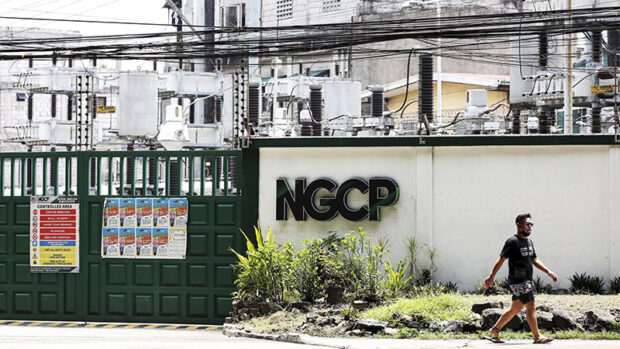Risa hits ‘questionable’ pass-on charges of NGCP

REVIEW Sen. Risa Hontiveros says a review of financial documents submitted by the National Grid Corporation of the Philippines to the Securities and Exchange Commission shows the country’s sole energy grid operator has incurred questionable expenses over a 14-year period. —LYN RILLON
The privately owned National Grid Corporation of the Philippines (NGCP) forked out P8.7 billion in janitorial and security services from 2009 to 2022, an operation expense that the country’s sole energy grid operator passed on to consumers as part of its transmission charge, according to Sen. Risa Hontiveros.
The transmission charge, or the cost of electricity delivery to the Meralco system, makes up 10.1 percent of a customer’s total monthly Meralco bill, while the generation charge, or the cost of electricity bought from suppliers, accounts for 55 percent.
“Does the NGCP really have to clean that much garbage that’s why they needed to spend [billions of pesos] for janitorial services?” Hontiveros asked in a media briefing on Monday.
“Meanwhile, the projects that they should have completed as mandated by their congressional franchise were super delayed and the cost of electricity remains high,” she said.
On top of this, the senator noted, thousands of Filipino households were still being deprived of access to a steady supply of energy largely due to NGCP’s failure to connect their areas to the main power grid.
Article continues after this advertisementHontiveros, who has been critical of China’s role in NGCP, first raised the grid operator’s questionable expenses during the budget hearing of the Energy Regulatory Commission (ERC) and the Department of Energy last Friday.
Article continues after this advertisementNGCP is 40-percent owned by the State Grid Corp. of China while the remaining 60-percent stake is equally shared by Monte Oro Grid Resources Corp. of tycoon Henry Sy Jr. and Calaca High Power Corp. of businessman Robert Coyiuto Jr.
In her interpellation, Hontiveros said a review of the financial documents that NGCP submitted to the Securities and Exchange Commission showed that it incurred questionable expenses during the 14-year period.
Aside from the amount it spent for janitorial and security services, the senator said NGCP also paid P2.3 billion for public relations and corporate social responsibility activities, P1.67 billion for representation and entertainment, and P1.1 billion for advertising.
She said NGCP’s biggest spending was “repairs and maintenance,” which cost P12.2 billion.
NGCP did not reply to the Inquirer’s several requests to comment on Hontiveros’ statement.
READ: NGCP chided at Senate hearing over charging consumers for delayed projects
Promotional spending
Hontiveros had earlier questioned the power utility’s ad spending since power transmission is considered a “natural monopoly,” which meant NGCP did not have any competitor for it to spend such an amount for promotion.
“For 14 years, money was spent for things that did not have a direct connection with [power] transmission services or project developments,” the senator noted.
“But these expenses were passed on to consumers and we, the Filipino consumers, shouldered and paid for these,” she lamented.
While passing the cost of its operations to consumers, she said NGCP made “unconscionable payout of cash dividends” to its shareholders.
According to her, NGCP’s total income from 2009 to 2022 hit P306.7 billion, P238.8 billion of which was declared and distributed as profits for its shareholders.
“China and the owners of NGCP were really lucky,” Hontiveros said sarcastically.
“Isn’t this highly irregular?” she asked. “The dividends of its shareholders amounted to 77 percent of the company’s total income. But we continue to suffer from power supply shortages and many of their projects were delayed.”
Responding to Hontiveros’ remarks, ERC Chair Monalisa Dimalanta said the state regulator had been conducting a review of NGCP’s performance as previously recommended by several senators.
She said the ERC had also issued a show-cause order on NGCP regarding its failure to deliver power transmission and connection projects on time.
“Depending on the evaluation—and we are [still] completing our evaluation of those projects—there could be [monetary] penalties imposed on NGCP,” Dimalanta said.
READ: Senators in disbelief over NGCP’s income: ‘We’ve been had’
Legal basis
“As to whether the amounts [of NGCP’s expenses] were justifiable or reasonable… we make sure that [the] amounts necessary for capital expenses for those transmission line projects will be allocated to these projects,” she added.
On the issue of the huge amounts given to NGCP’s shareholders, Dimalanta said the country’s corporate law states that “unrestricted retained earnings are those that can only be distributed to the shareholders” as dividends.
“But there is no law on windfall profit tax,” Dimalanta, a lawyer, pointed out.
“So it’s not illegal in that sense. As long as it is ‘unrestricted retained earnings,’ then the corporation can distribute [it as dividends] in general,” the ERC chief explained.
During the Senate energy committee’s inquiry into the company’s operations last May, NGCP assistant vice president Cynthia Alabanza admitted that they had been charging electricity consumers for the expansion and development projects that have not been completed, among them the full interconnection of the Visayas-Mindanao grids that should have been finished in 2019.
Alabanza apologized for the delays in the completion of the projects, many of which, she claimed, were affected by issues involving road right-of-way. INQ